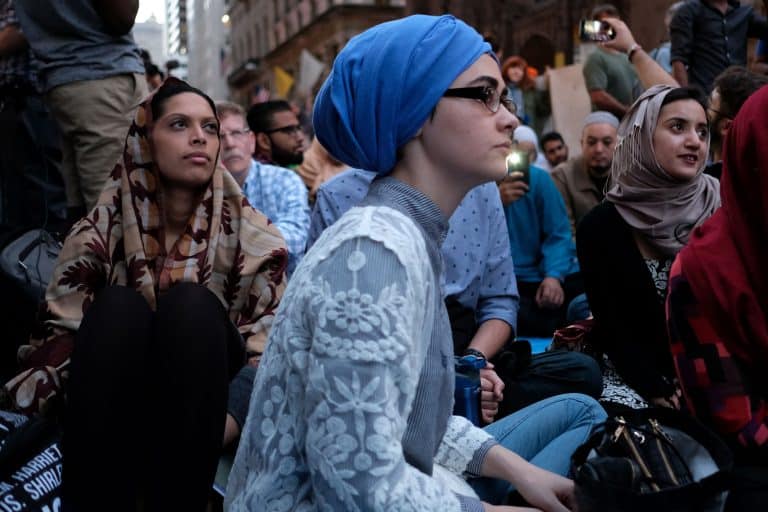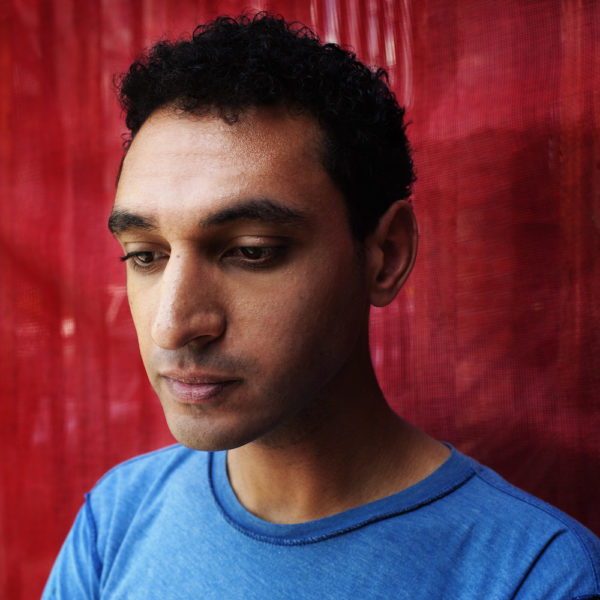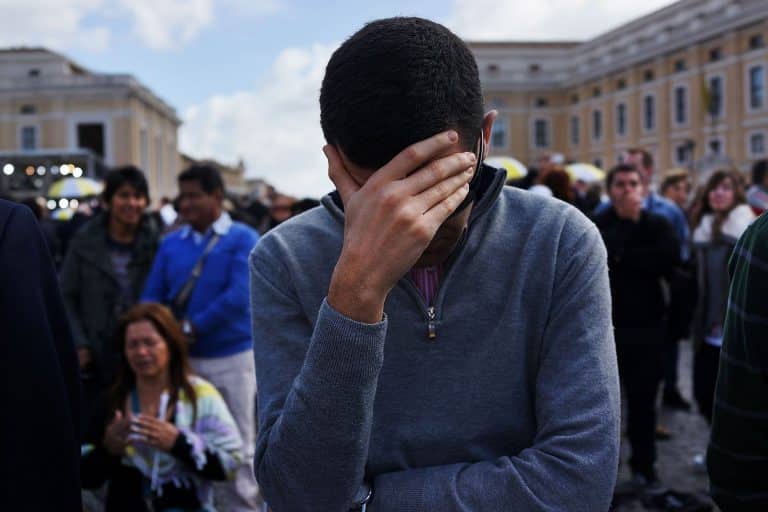
Muslims and supporters wait for Iftar, breaking fast during their holy month of Ramadan during a demonstration to protest US President Donald Trump's stand on Muslims and immigrants, near the Trump Tower in New York on June 1, 2017. Image by Jewel Samad/Getty Images, © All Rights Reserved.
We Need To Stop Asking Muslims To Atone for the Crimes of Violent Extremists
As the United States endures a day of coast-to-coast anti-Muslim rallies fueled by a fear that “Sharia law” is taking over the law of the land, I am preparing to return to the U.K. to install one of my recorded works in St. Ann’s Square in Manchester.
The work is modeled on the azan, the Islamic call to prayer. I conceived of it as a celebration of a sonic ritual that punctuates the lives of over 1.8 billion Muslims worldwide, a secular call to meditation or prayer. One of the most beautiful things about the azan is how the musical overtones of the human voice, such a fragile instrument, can cut through the cacophony and noise of our day-to-day muddle.
We planned all of this years before the attacks with no way of knowing that we would be forced to realize our art in a space that has been transformed into a nexus of mourning, a place filled with the scent of floral tributes and heavy with the somber prayers for the slaughtered innocent.
Suddenly, just as so many of our political debates about solving our serious issues as a nation disintegrated into security narratives after being hijacked by explosive attacks, my collaborators at the Manchester International Festival and I had to consider every action taken and every word uttered to the media. For every public appearance and every private gathering, we had to reconsider everything and account for a peace that was ruptured by violent savagery.
Other composers were also commissioned. If any of them had found themselves in the same situation, me and my colleagues at the festival would have none of the concerns that bedevil the Muslim artists represented. In my case, I have to contend with the depressing notion that I was not going to be able to share a pure sonic ritual that I intended as tender song and somber celebration. This sonic ritual, rooted in vocalizations that span over an millennium and a half, would now be tainted by media overeager to couple it with the connotations of violent destruction. Just like that, a potentially communal moment of meditation would be hijacked by the national security narrative. And all the while, we’d continue seeing commentary after commentary about how we have to accept that Islam is a radical faith and that I am, by default, as tainted as my Azan.
A recent article in the Guardian posited that Britain needs to be “less sensitive” about coupling Islam with violence. People who I thought were my friends have told me that I have my “head in the sand” if I don’t recognize that these acts of terrorism are “Islamic.” They don’t realize what we are clearly witnessing: the Islamization of radical violence and not the radicalization of Islam.
This is demonstratively true. I know that facts are unfashionable in this gut-driven age of ours, but they remain facts and they have a tendency to be stubborn even in the face of massive miscarriages of representation in the media. Here’s a chart from Princeton University’s Loonwatch as compiled from FBI data.
Defining terrorism in the most liberal way still produces numbers that don’t jibe with public perception. And this study shows a discrepancy between the frequency of attacks perpetrated by Muslims versus a general survey of media response that is truly staggering.
These statistics allow for leniency. In strict terms, terrorists are non-state actors who, with or without state sponsorship, seek to destabilize nations through tactics of intimidation and violence.
President Trump may have insisted that Omar Mateen, who massacred many, including someone in my circle of friends, was born “in Afghan,” but that doesn’t change the fact that Mateen was born in the very same town that Donald Trump was born in. What Mateen did is indefensible, but labeling his actions as “terrorism” accomplishes a double negative in which we turn our backs to one problem while also exacerbating another problem.
Mateen was as much of an American as James Hodgkinson. Hodgkinson just managed to launch an actual lethal assault on the government of the United States, and yet The New York Times describes him as a “lone shooter.” Adam Lanza, the man who showed us butchery in Sandy Hook Elementary School, was not described as a terrorist by anyone unless they were trying to make a point of the double standard.
To be clear, the insistence of Islamizing radical violence is much more stubborn than simply reserving the moniker of “terrorist” to be applied as soon as a violent act is discovered to have been committed by someone of a Muslim background. I remember when, in 2011, people spoke of being “horrified” en masse by the very concept of a “Christian terrorist.” But that’s exactly the title that Anders Behring Breivik bestowed on himself right after he killed 77 people in cold blood.
That friend of mine I mentioned earlier was happy to go online and suggest that I was in denial while he seemed to be unaware, or himself in denial of, the facts. I’ve seen this sort of exchange become so widespread in the corridors of social media that I felt moved to confront it. Our moment in history is too dangerous for anyone engaged in social and political discourse to simply ignore reality. My friends (the aforementioned is far from a rare occurrence on my walls and in my inboxes) are entitled to their opinions, but they are certainly not entitled to their own facts. They must get their heads out of the sand and see the world for what it is.
My latest opera gives a lyrically dramatic voice to one of the clearest leaders of our age: Benazir Bhutto. As I compose it, I cannot help but think back to the iconic moment in 1989 when the young Pakistani Prime Minister stood before Congress and declared:
“As a representative of the young, let me be viewed as one of a new generation of leaders unshackled by the artificial constraints and irrational hatreds of the past.
As a representative of women, let my message be to them, from the villages of Baluchistan to the universities of Lahore, Paris and Boston: ‘Yes, you can.’
As an adherent of Islam . . . let my message be about a compassionate and tolerant religion, teaching hard work and family values under a benevolent God, for that is the true Islam which we cherish.
Everywhere, the sun is setting on the day of the dictator.”
Were she alive today, Bhutto would weep to see the Oval Office occupied by a man who openly applauds dictators, and she’d balk at the notion that, all these decades after she delivered a message of hope to Congress, the likes of Ayaan Hirsi Ali would be given the opportunity to speak with U.S. lawmakers.
Back in 2010, Ayaan Hirsi Ali asked the question, “Why are Muslims so sensitive?” While she may fashion herself a feminist, liberal thinker, I fail to see the place that her impassioned rhetoric of hate informing a singularly negative view towards Muslims has in this. She is none of those things. And the bigoted argument she presented following her title is proof of that.
Does it occur to her that Mayor Sadiq Khan takes more grief than he needs to take and more arbitrary scrutiny than other mayors of London have taken? He’s endured this throughout his political career, well before Donald Trump volleyed his verbal trash-talk transatlantically. Sadiq Khan embodies the textbook definition of thick skin, not the mark of needless sensitivity.
While a Muslim mayor is securing the lives and unity of one of the largest cities in the Western sphere, Ayaan Hirsi Ali is being brought out from the lunatic fringe winter and let into the house only to incite faction and violence.
The good, thoughtful, liberal, and intelligent organizers in the U.K. were forced to accept that I would be treated differently because of my background and nothing else. They never signed up for that. They never would. I truly believe that they would be happier if they could approach my work, which is fittingly somber in tone, in the same spirit as all the other commissioned composers. As much as they would like to, they simply don’t have that option. They are taking great and meticulous pains to be infinitely more clear when describing my work to the press than they would with others. Given the general trends in the media that I’ve outlined above, who could possibly blame them?

Muslims aren’t inherently “hypersensitive.” Half of the defensive tweets from the current president of the United States should be proof enough of that. One yearns to tell Ayaan Hirsi Ali that “hypersensitivity” is not the sole practice of Muslims. If she possessed the qualities of a true expert, then she’d be able to see the world, and its 1.8 billion Muslims, as the diverse, complex, and contrapuntal spectrum of humanity that it is.
The world is often so complex that we lack the art to decipher what lies in the layers. But some things really are simple. Here’s why it’s important to uncouple Islamic ways of life from violence: because we are keen on surviving. We are also keen on the survival of the greater human family.
Having billions of people in Muslim-majority nations as well as Western ones goaded into civilizational conflict isn’t a great survival tactic.
Let’s cut right to it: I’m 31 years old. I want us to have a future. All of us. Not just Muslims. Muslims make up nearly one-quarter of the world’s population. They are part of a current that has shaped human civilization for over a millennium and a half. We’re not a new fringe movement that has yet to contribute to humanity’s shape. The Prophet Muhammad’s name is etched into the facade of the Boston Public Library in reverence to Islam’s role in keeping the flames of knowledge burning during the darkest ages. The Prophet is also one of the “lawgivers” sculpted into the forum of the United States Supreme Court in celebration of Muslim contributions to jurisprudence.
There’s a reason why Muslims and so many others would dearly like to see it become common practice to uncouple destruction-driven anarchists from Islam, and this reason has nothing to do with “sensitivity.” It’s because, like most other people, the overwhelming majority of Muslims (the non-lunatics) care about their own survival, the survival of fellow Muslims, and the survival of the greater species.
The consequences of embracing a heady mix that proclaims we can all be cleansed through politics will be far more devastating in its scope and reach than it was in the 1930s.
Take the peaceful majority of Muslims and combine that population with the populations of Europe and the United States. That’s over half of the world’s population and they just want to get through their days and sustain themselves and their loved ones. They have no galactic fight to pick. If the majority of those 1.8 billion Muslims were not peaceful people, if the majority of them wanted to destroy one another, we’d know it and it would be evidenced by a simple fact: the world would no longer exist. We’re not talking about subjugation here; we’re talking about mutually assured destruction.
When the West couples Islam and violence, the result is that it does more than just validate the “us against them” narrative of terrorists and extremists all over the world. It telegraphs a message to those billions of Muslims who have no beef with the West and has the West essentially saying: “We don’t care that you have no fight with us. We insist on picking a fight with you.”
Let me remind the many progressives who see my inability and unwillingness to pick a fight with a third of the world based on factually fraught statistics as evidence of some denial on my part: Exercising collective punishment is supposed to be against everything you stand for.
As for those who are trembling at the thought that Sharia law is conquering the United States, consider the fact that the Prophet is acknowledged as a lawgiver in the Supreme Court for Islamic legal contributions such as the right to counsel and the idea that human beings are innocent until proven guilty.
I’ve got nothing to do with the attacker. Period. If you want someone to punish, you’re looking in the wrong place. I will not be associated with, nor will I apologize for, the sins of others. I take accountability for my own actions; not others’.
If I were a Dominican composer preparing an installation in Times Square this summer, rather than a Muslim presenting in St. Ann’s Square, the festival presenters and I would not be forced into the uncomfortable conversations and considerations that are so tiresomely soul-killing to them and to me.
Resent-mongering extremists like Ayyan Hirsi Ali, many on the far right of American and European politics, as well as terrorist groups like ISIL can do nothing but sustain an enmeshed codependence that breeds faction and holds the rest of society hostage.
Everyone, from Ann Coulter and Ayyan Hirsi Ali all the way down to my head-in-the-sand friends who don’t understand why I refuse to associate one of our planet’s most significant cultures with the very violent extremism that they mirror from their codependent bedmates in ISIL-land, seem to lack an understanding of what liberal and open societies from the U.S. and the U.K. to the U.A.E. and Japan are actually defending.
But during the week of the London attacks, it was Sadiq Khan, a Muslim, and not the purported leader of the “free” world who articulated a defiant defense of our universal values:
“Terrorists want to attack London because they hate the fact that we don’t just tolerate each other – whether you’re a Christian, Muslim, Jew, Hindu, Sikh, Buddhist, member of an organized faith or not, we respect, embrace, and celebrate each other and that’s going to carry on.”

Muslims across the world do not need sympathy or sensitivity from the broader communities we live in. But this final point cannot be stated clearly or often enough: If those in the West who thrive on faction succeed in tearing our social fabric apart in order to capitalize on our divisions then we will not succeed in defeating violent extremism.
We can only do this together.
This isn’t because Muslims have magical information to report that will rid us of the scourge of terror. And it is certainly not because we have a special obligation to atone for the sins of others, people who have nothing to do with us. It’s not even because Bill Clinton, speaking at the DNC, implied that Muslims were here to help “us” win.
It it because when civilization is attacked, the entire civilized world must respond in unison.
How is civilization supposed to prevail when so many in the West choose the path that insists on picking a fight rather than accepting the partnership — and I mean full and equal partnership — with the second-largest civilizational force in human history?

